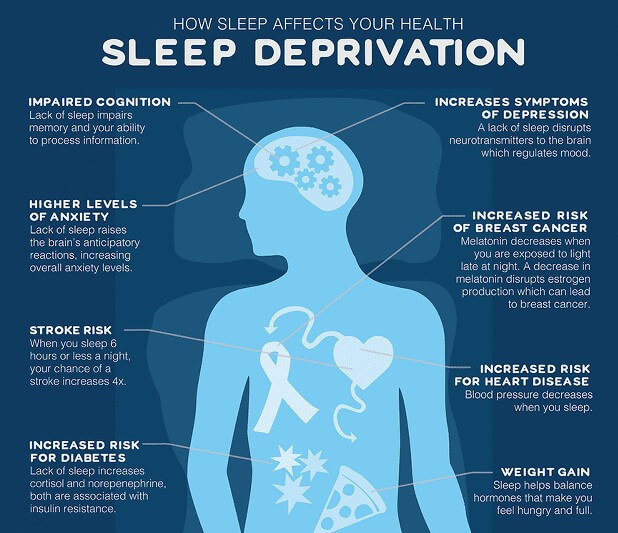The Importance of Sleep

Sleep is one of the pillars of good health along with nutrition and physical exercise. Unfortunately, sleep is also one of the major casualties of our modern zoom-dominated, “always-on” lifestyles.
How much sleep is sufficient? For most adults, at least 7 hours a day.
Studies show that lack of sleep affects every major system in our body.
1. Neurological:
Sleep is important for various aspects of brain function. This includes cognition, concentration, productivity, and performance. All of these are negatively affected by sleep deprivation.
Sleep is a powerful stress-reliever. It improves concentration, regulates mood, and sharpens judgment and decision-making. A lack of sleep not only reduces mental clarity but our ability to cope with stressful situations. This is due, in part, to the impact of chronically high levels of cortisol. Deep sleep which consists of roughly 20-25% of the overall sleep cycle is the most restorative.
2. Heart function:
At least two dozen studies have shown that people who don’t get enough sleep are at far greater risk of heart disease or stroke than those who sleep 7–8 hours per night.
3. Athletic Performance:
In a study on basketball players, longer sleep was shown to significantly improve speed, accuracy, reaction times, and mental well-being. When you sleep, you allow your body to repair and rebuild. During this time, the body is able to clear debris from the lymphatic system, engage in muscle repair, tissue growth, and protein synthesis.
4. Diabetes:
Experimental sleep restriction affects blood sugar and reduces insulin sensitivity. In a study in healthy young men, restricting sleep to 4 hours per night for 6 nights in a row induced symptoms of prediabetes.
5. Immune function:
One large 2-week study monitored the development of the common cold after giving people nasal drops with the cold virus. They found that those who slept less than 7 hours were almost 3 times more likely to develop a cold than those who slept 8 hours or more.
6. Digestion:
Poor sleep has been strongly linked to long-term inflammation of the digestive tract in disorders known as inflammatory bowel disease. One study observed that sleep-deprived people with Crohn’s disease were twice as likely to relapse as patients who slept well.
7. Obesity:
Short sleep duration is one of the strongest risk factors for obesity. In one extensive review study, children and adults with short sleep duration were 89% and 55% more likely to develop obesity, respectively.
Fortunately, maintaining proper sleep hygiene is not difficult. Consider the following simple ideas.
+ Establish a realistic bedtime and stick to it every night, even on the weekends.
+ Maintain comfortable temperature settings and low light levels in your bedroom.
+ Consider a “screen ban” on televisions, computers and tablets, cell phones, and other electronic devices in your bedroom.
+ Abstain from caffeine, alcohol, and large meals in the hours leading up to bedtime.
+ Exercise during the day; this can help you wind down in the evening and prepare for sleep.
People of all ages can experience sleep disorders. If you are practicing good sleep hygiene and are still having trouble sleeping, it’s important to consult your doctor or a sleep specialist. The field of sleep science is continuing to grow, and diagnostic tools such as sleep studies can help pinpoint the problem. Because getting good sleep is such an important part of functioning in day to day life, it is certainly worth a trip to the doctor to see what options are available to you.




